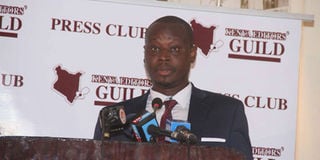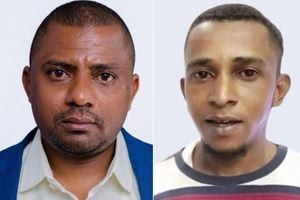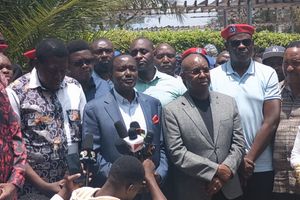Journalists raise alarm over personal safety, fake news

KUJ Secretary-General Eric Oduor at a past event.
As the country gears up for 2022 General Election, media practitioners have raised concerns about their personal safety and challenges related to fake news.
The Kenya Union of Journalists Secretary-General Eric Oduor said the issue of safety had led to self-censorship in the media, thus disrupting newsrooms.
“We will not allow perpetrators of violence against journalists to thrive. We will make sure that politicians promoting violence against journalists are barred from taking part in elections,” said Mr Oduor on Monday.
He spoke at Ciala Resort in Kisumu during a workshop on poll preparedness and election reporting guidelines organised by the Media Council of Kenya (MCK).
The new election reporting guidelines are a review of the 2017 guide that was meant to reaffirm the basics tenets of journalism, that is, to be fair, balanced and verify information before publishing.
Association of Media Women In Kenya (AMWIK) executive director, Ms Judie Kaberia, noted that in previous elections, the media had been blamed for its part in fuelling violence.
“We are committed to promoting democracy in the country. We cannot allow this country to sink into violence every 5 years,” she said.
She added: “The guidelines being launched today will help us avoid the mistakes the media commits during the electioneering period. We want our country to be stable even after 2022.”
MCK boss David Omwoyo noted that the review of guidelines was also meant to address concerns touching on social media and blogs.
“Another emerging issue is about the conduct of individual journalists on their social media spaces. You don’t become ethical on cameras or in your writing in the newspapers and then become biased when on social media,” said Mr Omwoyo.
He said the document will address concerns of media employees, especially those handling content, when they turn and become contestants in the elections.
However, Government spokesperson Cyrus Oguna noted that some community radio stations were operating without observing the rules.
“Who regulates what local politicians say in these community radio stations? We all witnessed what happened in 2007 in Kenya and 1994 in Rwanda. They were attributed to remarks that were aired irresponsibly by radio stations,” he said.
“Journalists have a critical role to play. Your pen becomes the weapon to protect this country. Whatever you are reporting, always ask yourself what consequences will follow."





